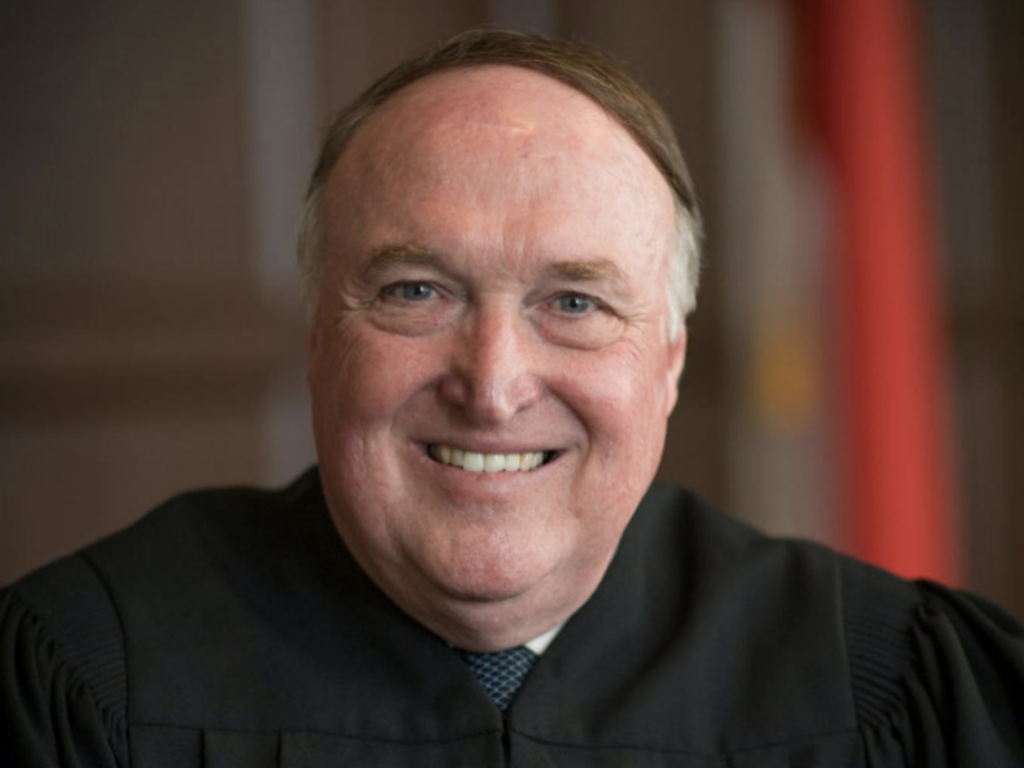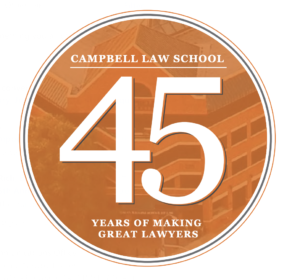Campbell Law 45th Anniversary Alumni Spotlight: Judge John M. Tyson ’79

Nominator: Payton Collier, Class of 2020
A native of Wilmington, North Carolina, Payton Collier is a magna cum laude 2020 graduate of Campbell Law School and a graduate of the University of North Carolina. Collier is a member of Ward and Smith’s litigation practice group based in Raleigh, where she assists clients in all phases of commercial litigation, from the filing of an initial complaint through trial. Prior to joining the firm, Collier was a summer associate with Ward and Smith. She served as an extern with the Honorable Judge John M. Tyson, drafting memoranda and opinions and analyzing a broad range of issues before the North Carolina Court of Appeals. She also interned in the Special and Composite Litigation Divisions at the North Carolina Department of Justice. While in law school, Collier served as managing editor of the Campbell Law Review.
Judge John M. Tyson is a member of Campbell University School of Law’s inaugural graduating Class of 1979. Elected in 2014, he is the first Campbell Law graduate to sit on the bench of the North Carolina Court of Appeals. A native of Cumberland County, after graduating from the University of North Carolina at Wilmington and Campbell Law School, Tyson earned his LL.M from the University of Virginia School of Law and MBA from Duke University. In addition to his legal career spanning more than 35 years which includes work in private practice as well as serving as a recall judge and emergency Superior Court judge, Judge Tyson, who is also a legal author, has taught as an adjunct professor at Campbell Law for nearly 35 years. In 2017, N.C. Supreme Court Chief Justice Mark Martin appointed Judge Tyson to the N.C. Dispute Resolution Commission for a three-year term.
Q: How did Campbell Law prepare you for your career?
A: Assistant Dean and Professor John J. “Jack” Broderick stated the purpose of Campbell Law is to “coalesce the practical with the theoretical.” Dr. Wiggins’ goal was for Campbell Law graduates to be competent and ready to practice law “from day one.” Many Campbell Law graduates went directly into private practice after passing the bar. At the Charter Class convocation, U.S. Senator Robert Morgan coined the phrase, “As Honest as a Campbell Lawyer,” to emphasize the high ethical standards that Dr. Wiggins, Dean Davis and the entire faculty insisted upon. Orange and black bumper stickers were printed with this phrase and were seen all over Harnett, Cumberland and Wake counties. Dr. Wiggins would often remark, “if you have not done it, you cannot teach it,” to emphasize the practical legal knowledge and experience required to effectively teach in the subject area. All professors were expert practitioners in the fields they were teaching. Excellence was expected of all. All these goals, purposes and mottos describe how Campbell Law prepared me for my career.
Q: Share a memory or experience that has had a lasting impact on your career.
A: In January 2001, I took my oath as a Court of Appeals Judge at Campbell University before an assembled audience of about 400 attendees, including my family, Chief Justice Lake, Dr. and Mrs. Wiggins, Dr. Wallace, Senator Morgan, Congressman Jones, Secretary of State Elaine Marshall, fellow justices and judges, and many classmates, friends and supporters. This day culminated from a long campaign and election, closing a law practice, taking the bench and beginning to teach again at Campbell Law that month. The outpouring of support and best wishes was humbling, and the day conveyed both the pride and expectations of the first Campbell Lawyer to serve on the appellate bench.
Q: As an alumnus and current adjunct professor, do you still feel the core values and experiences you had as a law student at Campbell are present at the law school today?
A: In the 1979 Charter Class placement bulletin, Founding Dean Leary Davis wrote: “Campbell proposes to educate lawyers who will be prepared from the outset of their careers to serve their communities with legal skill and ethical and intellectual leadership, in the noblest tradition of the counselor. The aims of the School of Law are to equip men and women for the general practice of law and all that such a practice involves; to foster the formulation of a sound philosophical and ethical foundation upon which the student can base his or her legal education and career; and to instill in the student a sense of the responsibility of the legal profession and of the individual lawyer as a member of the larger community.”
Since starting classes in 1976 and attending law school with the classes of 1979, 1980 and 1981, and having taught each class for nearly 35 years beginning in 1987, I have experienced the journey from putting the first books on the library shelves in Kivett Hall and being the only students at the law school for a year in 1976 to 1977, to the current law school facilities, faculty and curriculum. The school has matured through three presidents and nine full-time and acting deans and the move from the University campus in Buies Creek to an urban, freestanding law school in Raleigh in 2009. I have had the honor of teaching nearly 1,000 Campbell Lawyers, as either students, interns or law clerks at the Court, including children of classmates and children of earlier students.
With all the changes and improvements over 45 years and the expansion in faculty and staff with more than 500 students enrolled, our challenges include the cost of a legal education and the living expenses in Raleigh, and the high student debt upon graduation. We should explore the loss of camaraderie and friendships within and across classes by divisions into sections and becoming a commuter law school. We should search for ways to stop the disconnectedness of the law school with the greater University, its core values and increase opportunities with the other professional and undergraduate schools’ programs. The experiences of the Charter Class and the early years will always be unique and cannot be duplicated, but we should strive to maintain the uniqueness, mission and purpose articulated at the school’s founding.
Q: You have had extensive experience in private practice as well as serving in a judicial capacity. Do you feel that the skills required for both areas complement each other?
A: Judges rule on what lawyers do or did. Private practice experiences, competence and professionalism are the differences between presenting a winning and losing argument. Many trial judges used to tell me they could spot a “Campbell Lawyer” the moment they spoke in the courtroom: Competent – Confident – Professional – Prepared. Nine of my classmates were or are trial judges, four were elected District Attorneys or appointed U.S. Attorneys. The skills required to be a good lawyer are also required to be a good judge: knowledge of the law; ability and willingness to listen; ability to write and verbally communicate effectively; preparation; awareness of and meeting deadlines; and professionalism and ethical conduct.
Q: What does Campbell University’s motto “leading with purpose” mean to you?
A: The legal profession demands more than a law degree and a Bar license. Campbell Law has always emphasized the responsibilities of a Campbell lawyer to the profession, the courts and the communities in which we practice. We are encouraged to take positions of leadership, responsibility and active roles for our national, state and local Bar associations, fraternal and service organizations, school boards, local and state governmental boards, commissions and organizations and to provide pro bono services for those who cannot afford legal services. The “purpose” is the basis from our Christian and western civilization foundations at Campbell University, the focus on defending individual freedoms, human dignity and disdain and rejection of collectivism and of any authority that seeks to destroy our constitutional republic.
Want to nominate a Campbell Law Alumna/Alumnus to be featured in a 45th anniversary spotlight?
If you would like to nominate a fellow alumni who is living the university’s motto “leading with purpose,” please contact Lisa Snedeker at lsnedeker@campbell.edu for more information. The deadline for nominations is Oct. 25, 2021. All nominees and their nominators are invited to a complimentary 45th Anniversary celebratory dinner at Cafe Luna on Nov. 9, 2021.

